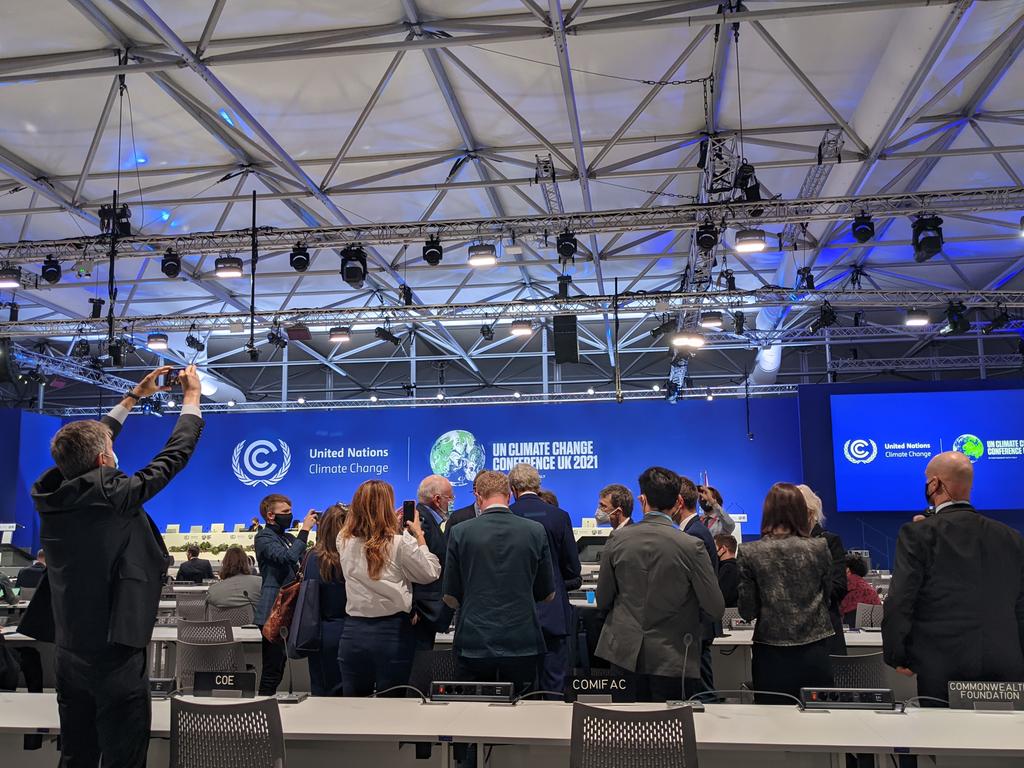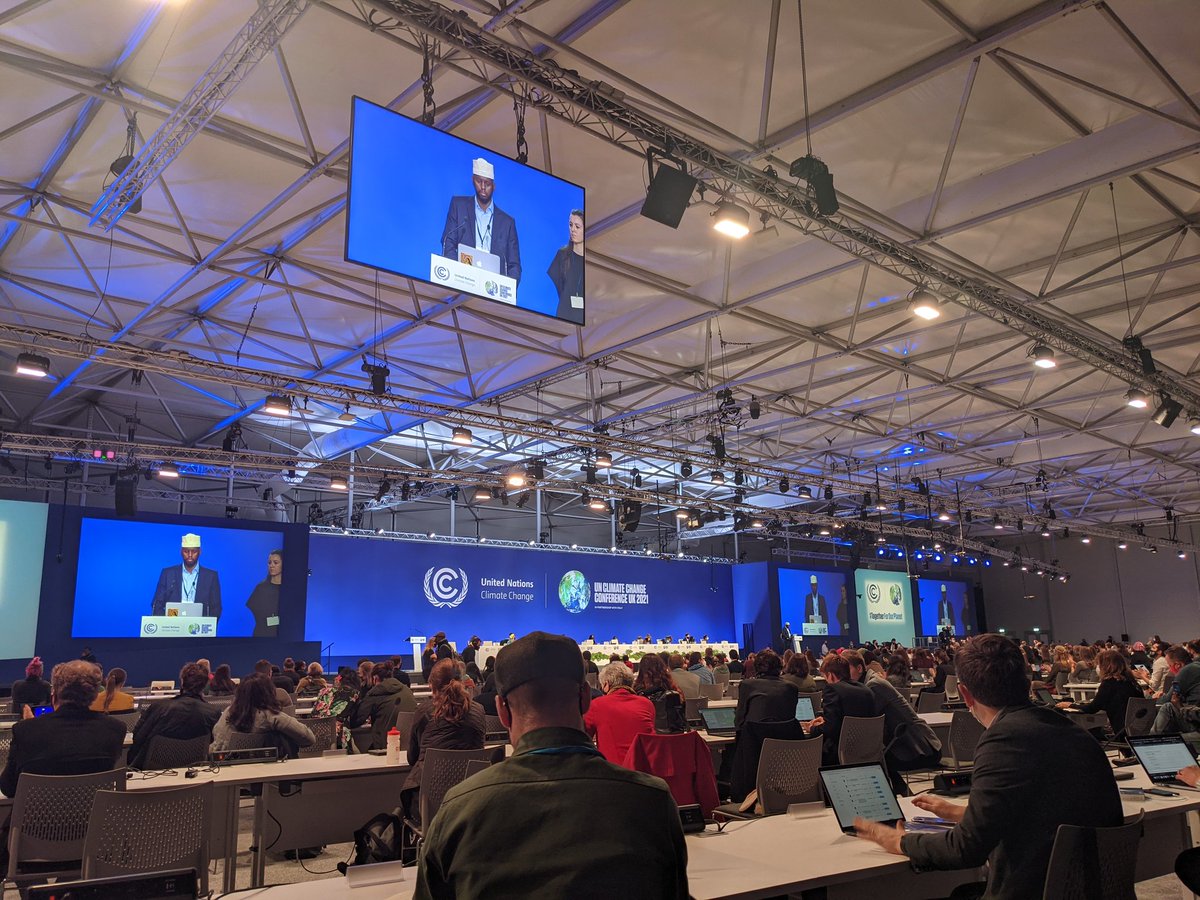
Media, and especially UK media, this goes to you. We often seek simple terms to describe climate COPs. And we have milestone COPs and, well, less milestone ones. For me, this was first and foremost a 'Media COP'. And it was not a milestone COP. It was never mean to be. (see next) 

I have been to COPs since 2008 and I do not recall a single one where media would have been given so much access to plenary. Informal stocktaking plenaries in the final days were broadcasted live and became partly a political theatre. In between... (continued)
... cameras crowded around huddling delegates. A live broadcast showed US, Chinese and other delegates hashing out final details of the texts. The President got emotional, which then made the evening news.
Why is this important? Because it helps understand this COP. (cont'd)
Why is this important? Because it helps understand this COP. (cont'd)
The Presidency wanted this COP to be a milestone COP. This was the story created for media. And media lined up. We got headlines like one below from BBC on how Glasgow "set the global agenda for the next decade" and highlighting two specific decisions with political messages. ... 

I honestly thought the Presidency could not pull it off, but I realised they did when a reporter on BBC said last night with a straight face that countries updated their NDCs in Glasgow.
The paragraphs about coal and subsidies were also baits that the media eagerly took.
The paragraphs about coal and subsidies were also baits that the media eagerly took.
In the first week of the COP, there was a pledge to have better quality journalism on climate change. I think this is crucial. People need to understand better how global climate governance works. It is a difficult process, but media professionals aren't expected to be experts...
Rather their role is to ask good questions, think critically, and communicate the complexity of this world - not to be lead.
So, to end this, just a few questions media could and should now be asking, as a humble proposal:
* What are the main decisions to come out of #COP26?
So, to end this, just a few questions media could and should now be asking, as a humble proposal:
* What are the main decisions to come out of #COP26?
* How do the COP decisions really help out the world on track to below 1.5C?
* What is the outcome on Article 6 (market and non-market mechanisms)? What are Article 6.2 and 6.4 really about? Was the outcome on these mechanisms robust? Will it help reduce emissions? ...
* What is the outcome on Article 6 (market and non-market mechanisms)? What are Article 6.2 and 6.4 really about? Was the outcome on these mechanisms robust? Will it help reduce emissions? ...
... What does the Article 6.2/6.4 outcome mean for markets? What on earth is Article 6.8 really about?
* Did we get robust reporting rules for countries' biennial transparency reports?
* Will the decision on common time frames lead to common NDC time frames? How does this...
* Did we get robust reporting rules for countries' biennial transparency reports?
* Will the decision on common time frames lead to common NDC time frames? How does this...
... help us with staying below 1.5C?
* What did developing countries really get on adaptation and finance?
* What is the global goal on adaptation and what will countries do in th next 2 years on it?
* Did vulnerable countries get more support to pay for loss and damage?
* What did developing countries really get on adaptation and finance?
* What is the global goal on adaptation and what will countries do in th next 2 years on it?
* Did vulnerable countries get more support to pay for loss and damage?
* How are developed countries being held accountable for not meeting their US$100 billion per year by 2020 target, which they have now promised to deliver on by 2023?
* What is the new collective quantitative goal on climate finance for post-2025 and how will it be negotiated?
* What is the new collective quantitative goal on climate finance for post-2025 and how will it be negotiated?
I could go on... But my point is simple: media needs to do a better job with covering global climate governance.
Ps. A good place to start working on this is here: enb.iisd.org/Glasgow-Climat…
@IISD_ENB #COP26
Ps. A good place to start working on this is here: enb.iisd.org/Glasgow-Climat…
@IISD_ENB #COP26
Pps. And with that I meant the @IISD_ENB as the best available resource for media - and anyone else for that matter - for unbiased information about global governance processes like the #UNFCCC.
ENB's summary and analysis of #COP26 will be out in the next couple of days.
ENB's summary and analysis of #COP26 will be out in the next couple of days.
Ppps. Just boarding a 7-hour flight so will respond to any questions/comments with a delay.
And how was the outcome in my view? Overall, seems good. #COP26 did its job. More is needed, yes. And more will come! Let's all together ensure that.
And how was the outcome in my view? Overall, seems good. #COP26 did its job. More is needed, yes. And more will come! Let's all together ensure that.
• • •
Missing some Tweet in this thread? You can try to
force a refresh








